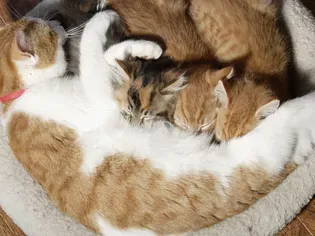How Long Should Kittens Stay With Their Mothers?
Updated on 05/27/24

How Long Should Kittens Stay With Their Mothers? The Definitive Guide
Bringing a new kitten into your home is an exciting time, but it's also important to remember that they are still babies and need special care. One of the most important things to consider is how long kittens should stay with their mothers.
The Benefits of Staying with Mom
There are many benefits to kittens staying with their mothers for as long as possible. Here are just a few:
* Nursing: Kittens need to nurse from their mothers for the first few weeks of life to get the essential nutrients they need to grow and develop properly.
* Socialization: Kittens learn important social skills from their mothers and littermates, such as how to interact with other cats and how to behave in different situations.
* Hygiene: Mothers help to keep their kittens clean and free of parasites.
* Protection: Mothers will protect their kittens from danger, such as other animals or predators.
When to Separate Kittens from Their Mothers
The ideal time to separate kittens from their mothers is between 8 and 12 weeks of age. By this time, they have had enough time to nurse, socialize, and learn from their mothers. However, there are some situations where it may be necessary to separate kittens from their mothers sooner, such as:
* If the mother is sick or unable to care for her kittens: In this case, it is important to find a foster mother or bottle-feed the kittens.
* If the kittens are orphaned: If the mother has died or abandoned the kittens, it is important to find a foster mother or bottle-feed the kittens.
* If the kittens are being weaned: If the kittens are starting to wean themselves from their mother's milk, it may be time to separate them.
How to Separate Kittens from Their Mothers
If you need to separate kittens from their mothers, it is important to do so gradually. Here are some tips:
* Start by introducing the kittens to a separate area: This could be a playpen or a small room. Place the kittens in the area with their mother for short periods of time, gradually increasing the length of time they spend away from her.
* Provide plenty of food and water: Make sure the kittens have access to plenty of food and water in their separate area.
* Monitor the kittens closely: Watch the kittens closely for any signs of distress, such as crying, pacing, or not eating. If you notice any signs of distress, you may need to reunite the kittens with their mother sooner.
Conclusion
Separating kittens from their mothers can be a difficult decision, but it is important to remember that it is in the best interests of the kittens. By following the tips in this guide, you can help to ensure that your kittens have a smooth transition to their new home.
Explore More Pets

Cat Behavior Problems
How to Stop Aggression in Kittens

Long-Haired Cat Breeds
Siberian Cat: Breed Profile, Characteristics, & Care

Cat Behavior Problems
How to Stop Kittens From Scratching and Biting

Long-Haired Cat Breeds
Turkish Angora: Cat Breed Profile, Characteristics & Care

Basic Training
How to Socialize Your Kitten

Short-Haired Cat Breeds
Cute Pictures & Facts About Calico Cats & Kittens

Litter Box Training
Training Your Kitten to Use the Litter Box

Long-Haired Cat Breeds
10 Fun Facts About White Cats
